Does Accutane Cause Hair Loss?
Reduce hair loss by eating a healthy diet, taking vitamin B supplements, and following a hair care routine.
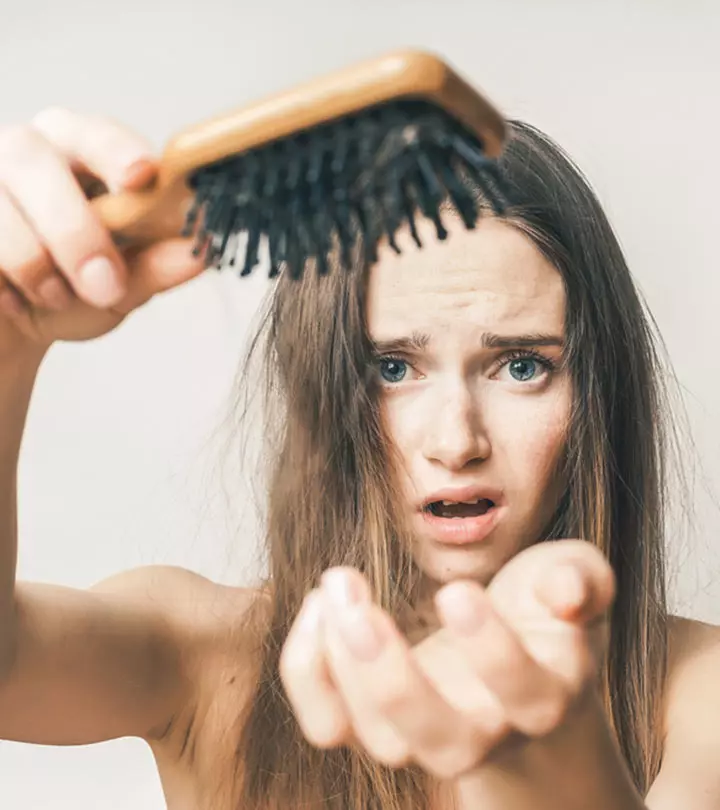
Image: Shutterstock
Accutane is a prescription medication for acne that is used as a last resort after all other treatment options are exhausted. In general, isotretinoin is a common drug used to treat acne, which is available under the brand name Accutane. But does accutane cause hair loss? How far is this true? This article explores the relation between Accutane and hair loss, the research behind it, and some tips to prevent hair loss while using this medication. Keep reading.
In This Article
What Is Accutane?

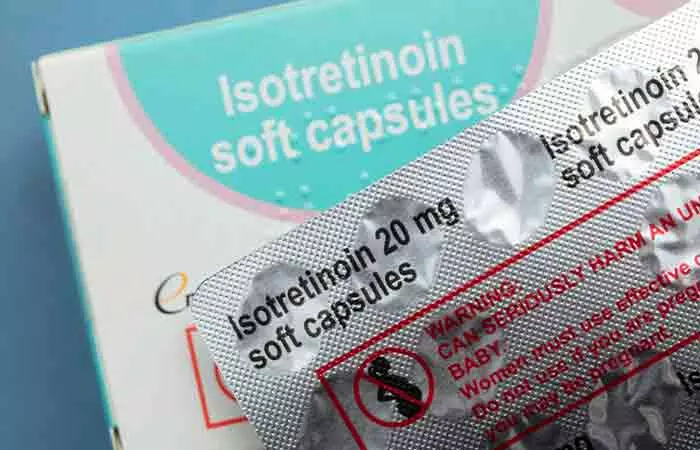
Isotretinoin, a vitamin A derivative, was sold under the brand name Accutane. It was an acne drug developed by Swiss drugmaker Roche Holding AG, which was discontinued in 2009.
Although oral isotretinoin or Accutane was approved by the Food And Drug Administration (FDA) in 1982, there were reports of potential side effects of the drug, linking it to depression and suicidal thoughts (1). The company discontinued manufacturing Accutane. However, it still distributes the generic versions of isotretinoin in the market.
Isotretinoin is used to treat severe acne that does not respond to other forms of treatment. Since it is a derivative of vitamin A, doctors advise avoiding taking vitamin A supplements while on isotretinoin.
Isotretinoin also has some serious side effects, including hair thinning and hair loss. Since teens encounter more acne-related issues, they are generally prescribed Accutane by dermatologists. Therefore, hair loss in teens was cited as a common side-effect. Keep reading to find out how this medication is linked to hair loss.
 Quick Tip
Quick TipKey Takeaways
- Accutane is a potent acne medication and may cause temporary hair loss as a side effect since it impacts the hair growth cycle.
- The hair loss is temporary and subsides once you discontinue the medicine. But it takes time to completely recover from the hair loss.
- Maintain a healthy diet, take B vitamins, avoid excess vitamin A supplementation, follow a proper hair care routine, and manage stress to reduce hair loss.
Why Accutane May Cause Hair Loss
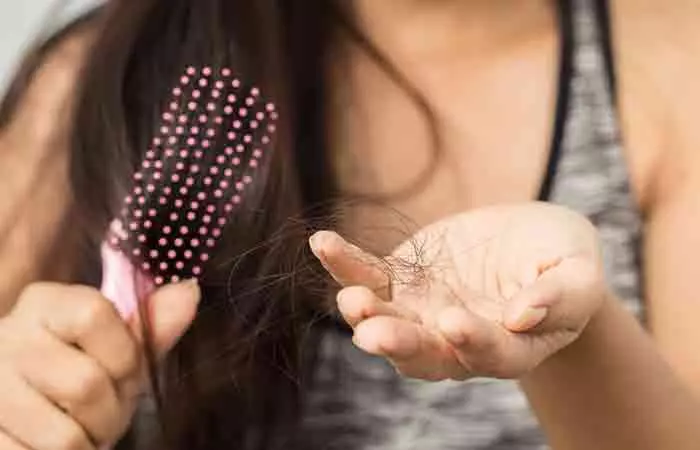
Accutane is considered one of the prominent medications that cause hair loss. However, the exact mechanism of how isotretinoin causes hair loss is still unknown. A study found that it may cause alopecia areata (hair loss in patches) (2). However, more research is needed to arrive at a conclusion.
Veronica, a blogger, took Accutane to manage acne and noticed some hair loss. She writes, “One side effect I noticed a bit more in my last month was hair loss, again my hair is not thinning and if you felt my hair you would never think to say my hair was thin. But before Accutane I had massively thick hair, and I notice it’s a bit thinner when I put it up in a ponytail (i).” However, she also noted that this was a temporary side effect and is expecting her hair to regain its normal thickness.
In most cases, such hair loss is temporary, and people recover once the drug is discontinued. However, in some instances, hair loss can be permanent. Let’s find out what scientific research says about this.
What The Research Says

Research indicates that the drug may suppress the hormones present in the pituitary glands (2). This hormone suppression may help clear acne. However, it may also affect the hair growth rate.
Another study suggested that isotretinoin taken in low dosage (0.5 mg/kg per day) may not affect the hair (3). However, using high doses of isotretinoin or retinoids may cause hair loss (4).
Usually, doctors tailor the dosage of the drug, depending on the severity of acne. Unregulated use of isotretinoin may trigger hair loss. Wondering if the hair loss is permanent or not? Find out in the next section.
Does Accutane Cause Permanent Hair Loss?
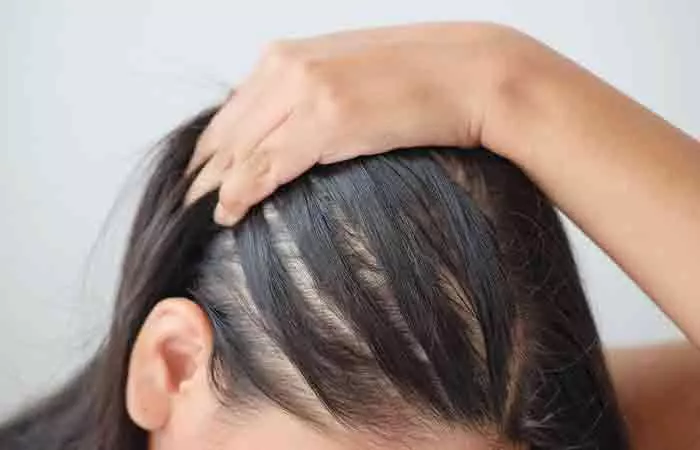
No. Accutane will not cause permanent hair loss if you follow the dosage prescribed. You may experience hair fall, but it will subside once you stop taking isotretinoin.
Doctors usually administer a low dosage, monitor the individual’s reaction to the drug, and then create a treatment plan. If you are experiencing hair loss while using isotretinoin, you may talk to your doctor for preventive measures or follow these tips.
Tips To Prevent Hair Loss While Using Accutane
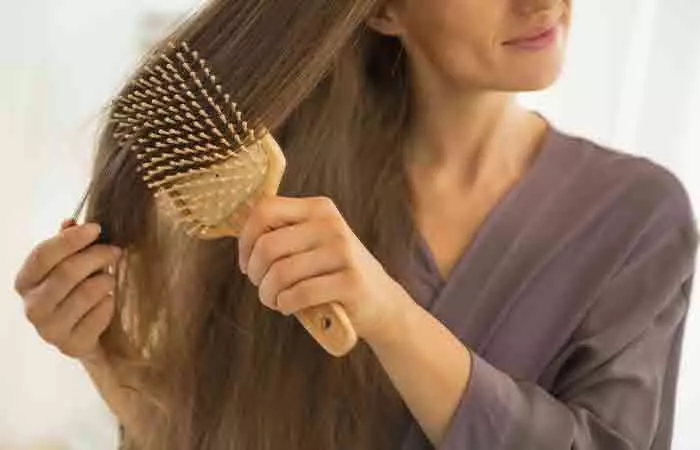
- Follow A Healthy Diet: Follow a healthy diet plan that includes vegetables, fruits, dairy, and meat. This will help prevent vitamin and mineral deficiencies and hair loss.
- Take B Vitamins: Isotretinoin treatment may cause vitamin B deficiency, especially folic acid (vitamin B9) (5). This may trigger hair loss (6). Consult a doctor to find out the right dosage you may need.
- Avoid Vitamin A Supplements: An excess of vitamin A may cause hair loss and other complications. Hence, avoid taking vitamin A supplements while on isotretinoin treatment.
- Follow A Hair Care Routine: A proper hair care regimen with the right hair products keeps the hair strong and healthy. This may help prevent hair loss.
- Stay Stress-free: Stress is a major reason for hair loss (7). That is why it is crucial to avoid stressing out. You may try meditation, take up a hobby, exercise, socialize, travel to different places, or do whatever keeps you happy.
- Use Sulfate-Free Shampoos: Sulfate-free shampoos thoroughly cleanse your scalp and hair without stripping away the natural oils. This way, they help prevent moisture loss and combat hair damage, frizziness, dryness, and even hair loss. The shampoos are less harsh on the scalp too. Hence, they help maintain the strength of the hair follicles and possibly prevent hair breakage.
- Use A Wide-Tooth Comb: Wide-tooth combs are much gentler on the scalp when compared with fine-tooth combs. These combs imitate a gentle scalp massage and may boost blood circulation to prevent hair loss.
 Quick Tip
Quick TipInfographic: 5 Ways To Prevent Hair Loss While On Accutane
Attention Accutane users experiencing hair loss! It’s time to show your hair some serious love. We have compiled the ultimate hair care tips just for you, from nourishing foods to a scalp massage. Check out the informative infographic below and discover 5 hair-saving secrets to keep your locks strong while taking Accutane.
Some thing wrong with infographic shortcode. please verify shortcode syntaxThe Takeaway
Accutane hair loss is a side effect of Accutane, a drug used to treat acne. However, this hair loss is only temporary and stops when the usage of the drug is discontinued. Research also says that this drug can affect hair growth rate. However, you can manage this hair loss by following a few preventive tips like consuming a healthy diet, taking B vitamins, avoiding excessive intake of vitamin A supplements, following a hair care regime, and staying stress-free helps combat hair loss by Accutane.
Frequently Asked Questions
How can I tell if my hair loss is due to Accutane?
If your hair starts thinning or falling out during or shortly after your Accutane treatment, it might be linked. Talk to your dermatologist for confirmation and advice.
How common is hair loss on Accutane?
Hair loss caused by isotretinoin isn’t that common. To minimize the likelihood of hair loss while taking an Accutane prescription, we must, however, take all reasonable precautions. This should be done by following doctors’ instructions and managing other factors.
Can I take biotin while on Accutane?
There were no interactions observed between Accutane and biotin. However, discuss with your doctor before you take them together.
Can Accutane change your hair texture?
Yes, Accutane (isotretinoin) can result in hair loss or thinning by interfering with the normal hair cycle or harming hair follicles, especially in those who are sensitive to it or taking high doses.
Does Accutane make your hair frizzy?
Patients taking Accutane or isotretinoin may experience a decline in their hair’s texture, thickness, and quality. Your hair may be more frizzy and difficult to style, with more flyaways.
How long does hair loss last after Accutane?
Thankfully, hair loss following the use of isotretinoin (or other vitamin A derivatives) appears to be transient. Normally, hair regrowth starts as soon as you stop your treatment. Hair can occasionally take several months to return to its original state.
Are there any natural alternatives to Accutane?
Antioxidants: repairing oxidative damage and generating new skin cells. Omegas help your skin by replacing unhealthy fats with skin-loving ones, fighting bad oil with good oil. Omega 7 helps to reduce skin inflammation. Beta-carotene is a secure substitute for Vitamin A and its natural precursor.
Illustration: Does Accutane Cause Hair Loss?

Image: Dall·E/StyleCraze Design Team
References
Articles on StyleCraze are backed by verified information from peer-reviewed and academic research papers, reputed organizations, research institutions, and medical associations to ensure accuracy and relevance. Read our editorial policy to learn more.
- The use of isotretinoin in acne
https://www.ncbi.nlm.nih.gov/pmc/articles/PMC2835909/ - Alopecia areata and isotretinoin; coincidence or causal relation
https://onlinelibrary.wiley.com/doi/abs/10.1111/dth.13280 - Isotretinoin influences pituitary hormone levels in acne patients
https://pubmed.ncbi.nlm.nih.gov/21103844/ - Evaluation of biophysical skin parameters and assessment of hair growth in patients with acne treated with isotretinoin
https://www.ncbi.nlm.nih.gov/pmc/articles/PMC3907898/ - The effects of isotretinoin therapy on serum homocysteine, folate and vitamin B12 levels in patients with acne: a meta‐analysis and meta‐regression
https://onlinelibrary.wiley.com/doi/full/10.1111/jdv.15886 - The Role of Vitamins and Minerals in Hair Loss: A Review
https://www.ncbi.nlm.nih.gov/pmc/articles/PMC6380979/ - Hair and stress: A pilot study of hair and cytokine balance alteration in healthy young women under major exam stress
https://www.ncbi.nlm.nih.gov/pmc/articles/PMC5397031/
Read full bio of Dr. Shruti Chavan
Read full bio of Anjali Sayee
Read full bio of Eshna Das
Read full bio of Krati Darak





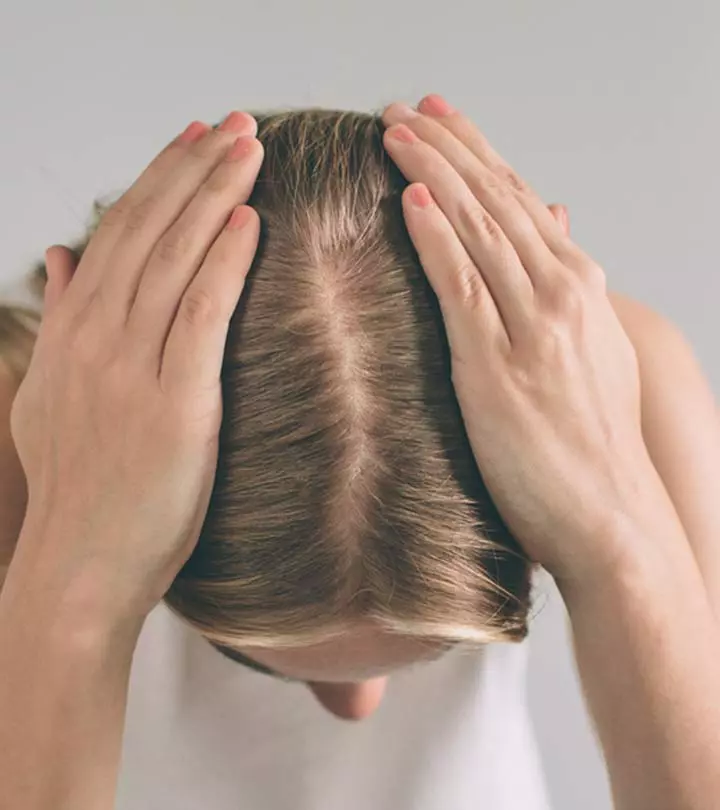
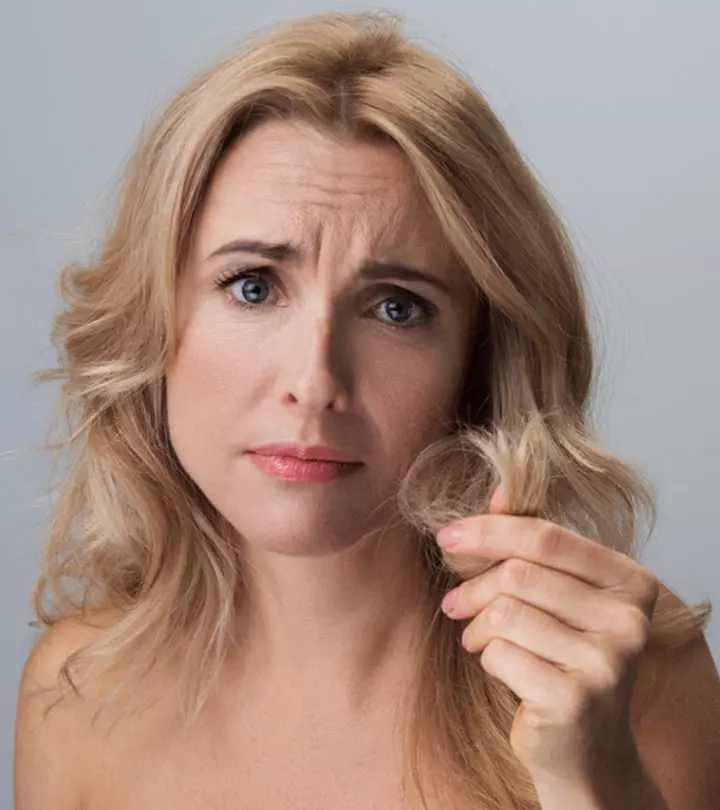
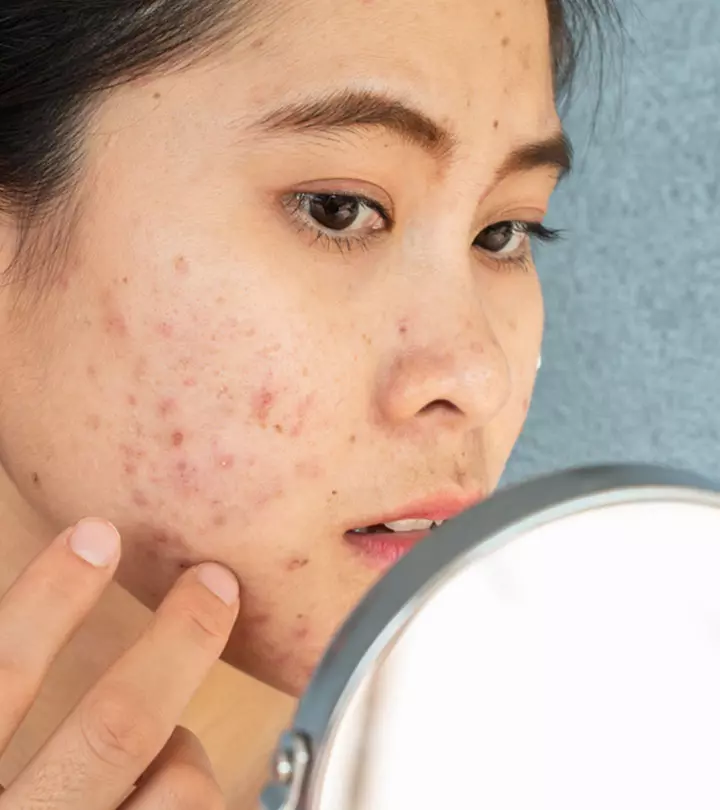
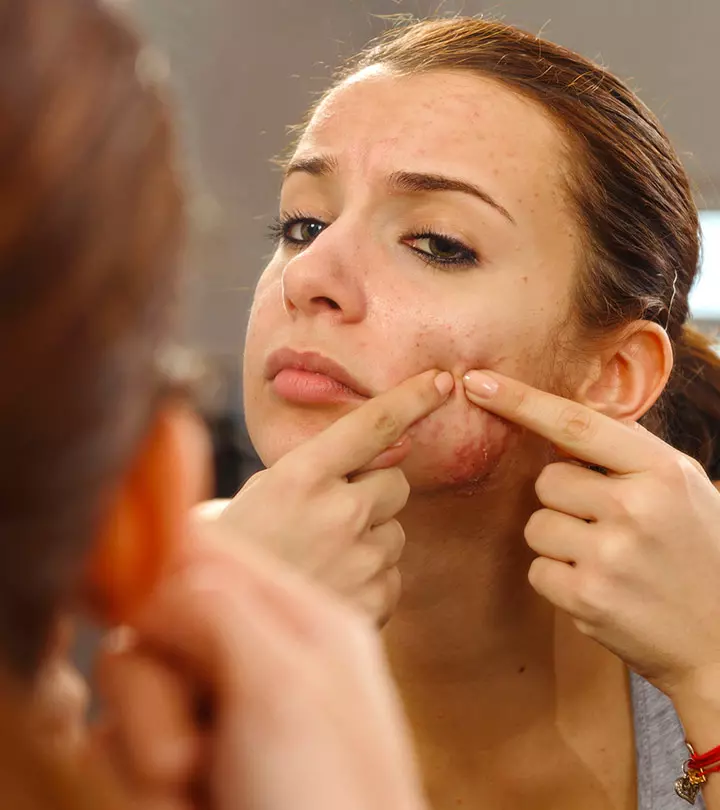



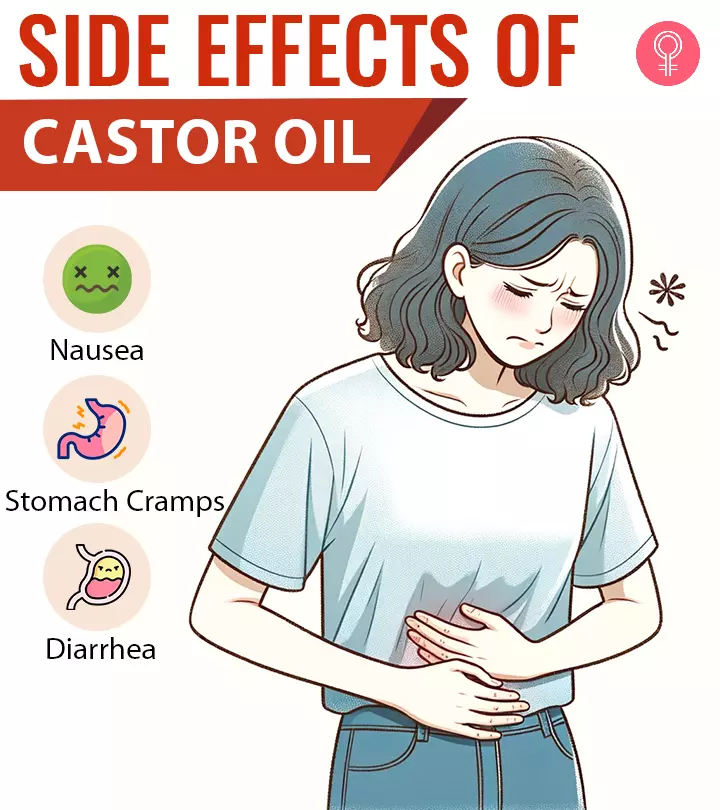













Community Experiences
Join the conversation and become a part of our empowering community! Share your stories, experiences, and insights to connect with other beauty, lifestyle, and health enthusiasts.